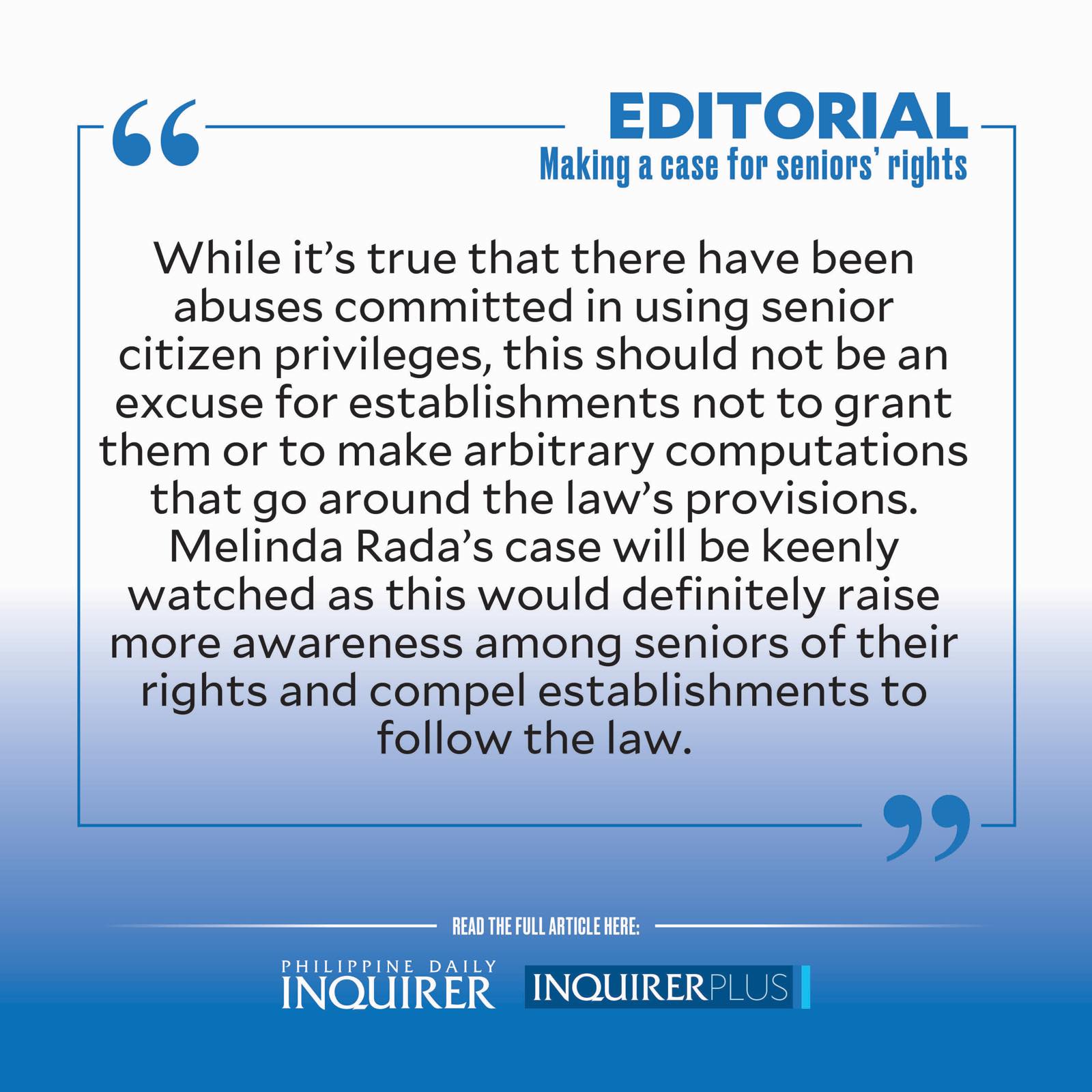Making a case for seniors’ rights

The Expanded Senior Citizens Act or Republic Act No. 9994 was enacted in 2010 to recognize the senior citizens’ contribution to nation-building during their prime and to ensure their well-being through certain benefits once they have turned 60 or have retired.The law certainly has good intentions but its implementation has been tricky for many beneficiaries. This week, a senior citizen was prompted to file a case against a Pasig hotel for refusing to grant her discounts as provided under RA 9994. In a complaint filed before the Pasig prosecutor’s office, Melinda Rada said the hotel refused to grant her 12 percent value-added tax (VAT) exemption and 20 percent discount as a senior. The hotel claimed that the rate was already on “promo” but failed to show proof that it was approved by the Department of Trade and Industry.
This is not the first time that a senior citizen has filed a case against a business establishment for refusing to honor the privileges as provided by law. In 2011, a senior citizen sued a Silliman University Cooperative manager for refusing eight times to grant a 20-percent discount on a soft drink. While the high court reversed—a decade later—the jail sentence and fine meted out to the manager by the lower court on the ground that cooperatives that run canteens are exempt from the mandated discount for seniors, there are many other instances where restaurants, hotels, groceries, pharmacies, etc. refuse to honor the benefits accorded seniors; they just do not reach the courts. Just last month, a viral social media post showed a fast-food outlet apparently cutting back on the VAT and senior citizen discount—prompting others to share similar experiences with other establishments.
But despite these violations, how many of the country’s estimated 10.3 million senior citizens are aware of the law’s nitty-gritty and, like Rada, are willing to pursue a case? There have been many situations where seniors, either because they do not want to create a scene or are not fully aware of their rights, would simply accept an establishment’s reasoning that they do not give discounts.
There has to be awareness of what exactly the law entitles senior citizens. Aside from VAT exemption, seniors are entitled to a 20-percent discount on goods and services, medicine and drug purchases, transportation (air, sea, land), and funeral services. Last March, the high court ruled that interment services for seniors are covered by the 20-percent discount after a private firm engaged in the business of selling memorial lots and offering interment services argued that such service was not covered.In addition, senior citizens, under certain conditions, can also avail of a minimum five percent discount on water and electricity, free medical and dental services, free vaccinations as well as social safety nets including financial assistance for house repair during calamities. There also has to be awareness that the law penalizes those who refuse to honor the senior citizen card with a jail term ranging from two years to six years and a fine from P50,000 to P100,000. On the other hand, those who abuse their privileges can be imprisoned for up to six months and fined from P50,000 to P100,000.While it’s true that there have been abuses committed in using senior citizen privileges, this should not be an excuse for establishments not to grant them or to make arbitrary computations that go around the law’s provisions. In 2022, the Commission on Audit found there were 196,695 cases where health-care institutions in seven regions did not grant senior citizen discounts amounting to P535.626 million. As a letter-sender to this paper asked: “Who is to blame for benefits not granted to senior citizens?”
It is the state’s responsibility, particularly the National Commission of Senior Citizens (NCSC) and the Office for Senior Citizens Affairs under local governments, to ensure that the law is implemented—including monitoring whether establishments are extending these benefits. The NCSC must be more inclusive—only 3.5 million or 34 percent of the total senior population has been registered under the commission. It must reach out to the rest and ensure that they are made aware not only of their rights but of the recourse that they have in situations where they are denied these benefits. Not everyone is like Rada who is aware of her rights and is determined to assert them, and this lack of awareness or determination among other senior citizens emboldens establishments to continue with the malpractice. Rada’s case will be keenly watched as this would definitely raise more awareness among seniors of their rights and compel establishments to follow the law.These benefits go a long way, especially for many senior citizens who need financial support. That they are deprived of these goes against their constitutional right to avail of social benefits. We must ensure that we are a society that takes care of our seniors to honor their invaluable legacy in shaping our families, our communities, and our country.




















